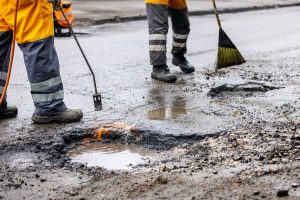
It is a sure sign of Spring when people begin asking about whether they can sue their town over potholes. Sometimes the question comes from clients and other times from friends and family in a half-joking (and half-very-serious) manner. In Maine, potholes are inevitable, and people are understandably frustrated by the damage they can cause.
Potholes are often the subject of news articles this time of year all across the state; for example, Bangor Daily News reported that pothole complaints as of February 2022 were up by over 700 percent from the previous year. There is no doubt that people take this issue very seriously. And given the prevalence of potholes in Maine, municipalities are also in a tough position in trying to track and repair them.
Immunity under Maine Tort Claims Act
To get to the heart of the question, the basic underlying principle is that municipalities generally cannot be sued over potholes. Municipalities are immune from suit under the Maine Tort Claims Act (MTCA), which is codified at 14 M.R.S. §§ 8101–8118. Except as provided in four narrow exceptions, this statute shields all government entities—which includes the State, counties, and towns responsible for the roads—from any and all claims seeking recovery of damages based on the entity’s negligence or wrongdoing. Recovery of damages means compensation for expenses like medical bills associated with a physical injury and the cost of repairing your car.
The four exceptions that do exist, meaning that the government entity can be sued and held liable, are for claims involving property damage, bodily injury, or death for a government’s negligent acts or omissions involving:
(1) ownership, maintenance, or use of vehicles, machinery, and equipment;
(2) public buildings;
(3) discharge of pollutants; and
(4) road construction, street cleaning, or repair.
14 M.R.S. § 8104-A. While the fourth exception—road construction, street cleaning, or repair—appears promising, it only covers situations where a municipality is actively working on roads. It is not applicable to a general lack of repair, such as the failure to fill potholes. Within this exception, the law explicitly and broadly states:
“A governmental entity is not liable for any defect, lack of repair or lack of sufficient railing in any highway, town way, sidewalk, parking area, causeway, bridge, airport runway or taxiway or in any appurtenance thereto.”
Unfortunately, then, a person generally will not be able to sue a municipality for damages or injury caused by a pothole.
Liability under Local Highway Law

Notwithstanding immunity under the MTCA, there is one statute that may apply. One chapter of the local highway law, often referred to as the defect law, can provide relief in some limited situations. See 23 M.R.S. §§ 3651–3659. Under section 3655, a person can sue a municipality or county for damages if that person is injured or suffers property damage because of a street defect or lack of repair where the municipality or county has a legal obligation to maintain the street. This law is the most promising avenue for recovering damages, but it has its limitations.
If the State is responsible for maintaining the road rather than the municipality, section 3655 does not provide a remedy; that law applies only to counties and towns. See Hodgdon v. State, 500 A.2d 621, 623–25 (Me. 1985). When the law does apply, to recover against a town or county the person must be able to prove that the responsible authority—which may be municipal officers (e.g., a select board or city councilor), the county commissioners, or the road commissioner—had at least 24 hours’ actual notice of the defect or want of repair.
Actual notice can be difficult to prove, and it is insufficient to show that the responsible authority should reasonably have known about the pothole. That is, the authority must have actually known about that specific pothole or defect. Actual notice would include receiving a report about a particular pothole. For this reason, it would not be enough to say that the authority knew because potholes always happen as a result of freeze thaw cycles. For the responsible authorities, this 24-hour period gives them time to quickly address the pothole to minimize the risk of injury or damage and meet their obligation to maintain the road.
Section 3655 and Prior Notice
Another barrier to winning a lawsuit under this section against a town or county for damages caused by a pothole is if the person harmed had notice. If that person had notice of the condition of the street prior to the time of the injury, recovery is not available unless that person previously notified the responsible authority of the specific defective condition. That is, if a driver has reason to know about the condition of the road, that person likely cannot succeed in their claim against the town or county unless they reported the pothole.
An important distinction here is that a person who suffers damage does not need to have actual notice of the defect prior to an injury to trigger the need to notify the responsible authority, unlike the level of notice that the authority must have to trigger liability. To bar recovery for harm caused by a pothole, the person need only reasonably have known of the condition of the road. To meet this level of notice, a municipality could defend a claim by simply arguing that the person drives the same route every day and reasonably should have known about the defect. Since most people do not make complaints or reports about specific potholes, section 3655 provides only a very limited remedy.
Section 3655 also includes other limitations: a person has to file a lawsuit within one year of the date of the injury or damage, and there is a cap on the amount of money a person can receive. In some cases, that cap may be $6,000. The person claiming injury or damage must also meet an earlier deadline: a person must notify the municipal officers, county commissioners, or road commissioner in writing of the injury or damage within 180 days of the event.

Summary
Generally, your town will be immune from a lawsuit—and liability—for potholes. If you want to both improve the roads and preserve your ability to successfully sue for damages caused by a pothole, the best thing to do is report potholes to the appropriate authority so they can be repaired. This helps municipalities and counties know what roads need attention, increases the likelihood of getting them repaired quickly, and may help support a damage claim under section 3655 if injury or damage ultimately results.
Remember, section 3655 applies only to roads that are the responsibility of a municipality or county to maintain; it does not apply to State or private roads. So the original question was: can you sue a municipality to be compensated for injuries or damages caused by a pothole? To assess your situation, ask yourself these questions:
- Was the pothole on a road that the municipality or county is responsible for maintaining?
- Did the town or county have actual notice of the pothole?
- Did you have notice of the pothole; that is, should you have known about it? Remember, this does not mean that you had to actually know about the specific pothole.
- If you did have notice of the pothole, did you report it to the responsible authority?
These questions will help you determine whether or not you may have a viable claim against a municipality or county under section 3655. As with anything, however, the specific facts of a situation make a difference. Contact one of our attorneys today to find out if your town might be liable for injuries or damages caused by a pothole.
